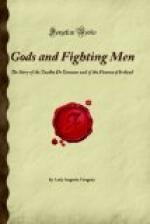Then he himself and Oisin made an attack on one another, and it seemed for a while that the battle was going against Oisin. “By my word, Man of Poetry,” said Finn then to Fergus of the True Lips, “it is a pity the way you sent my son against the foreigner. And rise up and praise him and hearten him now,” he said. So Fergus went down to where the fight was, and he said: “There is great shame on the Fianna, Oisin, seeing you so low in this fight; and there is many a foot messenger and many a horsemen from the daughters of the kings and princes of Ireland looking at you now,” he said. And great courage rose in Oisin then, and he drove his spear through the body of Forne, the King of Lochlann’s son. And he himself came back to the Fianna of Ireland.
Then the armies of the World gave out a great cry, keening Forne; and there was anger and not fear on his brothers, for they thought it no right thing he to have fallen by a man of the Fianna. And Tocha, the second son of the King of Lochlann, went on shore to avenge his brother. And he went straight into the middle of the Fianna, and gave his sword good feeding on their bodies, till they broke away before him and made no stand till Lugaidh’s Son turned round against him. And those two fought a great fight, till their swords were bent and their spears crumbled away, and they lost their golden shields. And at the last Lugaidh’s Son made a stroke of his sword that cut through the foreigner’s sword, and then he made another stroke that cut his heart in two halves. And he came back high and proud to the Fianna.
Then the third son of the King of Lochlann, Mongach of the Sea, rose up, and all the armies rose up along with him. “Stop here, Men of the World,” he said, “for it is not you but myself that has to go and ask satisfaction for the bodies of my brothers.” So he went on shore; and it is the way he was, with a strong iron flail in his hand having seven balls of pure iron on it, and fifty iron chains, and fifty apples on every chain, and fifty deadly thorns on every apple. And he made a rush through the Fianna to break them up entirely and to tear them into strings, and they gave way before him. And great shame came on Fidach, son of the King of the Bretons, and he said: “Come here and praise me, Fergus of the True Lips, till I go out and fight with the foreigner.” “It is easy to praise you, son,” said Fergus, and he was praising him for a long time.
Then the two looked at one another and used fierce, proud words. And then Mongach of the Sea raised his iron flail and made a great blow at the King of the Bretons’ son. But he made a quick leap to one side and gave him a blow of his sword that cut off his two hands at the joint; and he did not stop at that, but made a blow at his middle that cut him into two halves. But as he fell, an apple of the flail with its deadly thorns went into Fidach’s comely mouth and through his brain, and it was foot to foot those two fell, and lip to lip.




